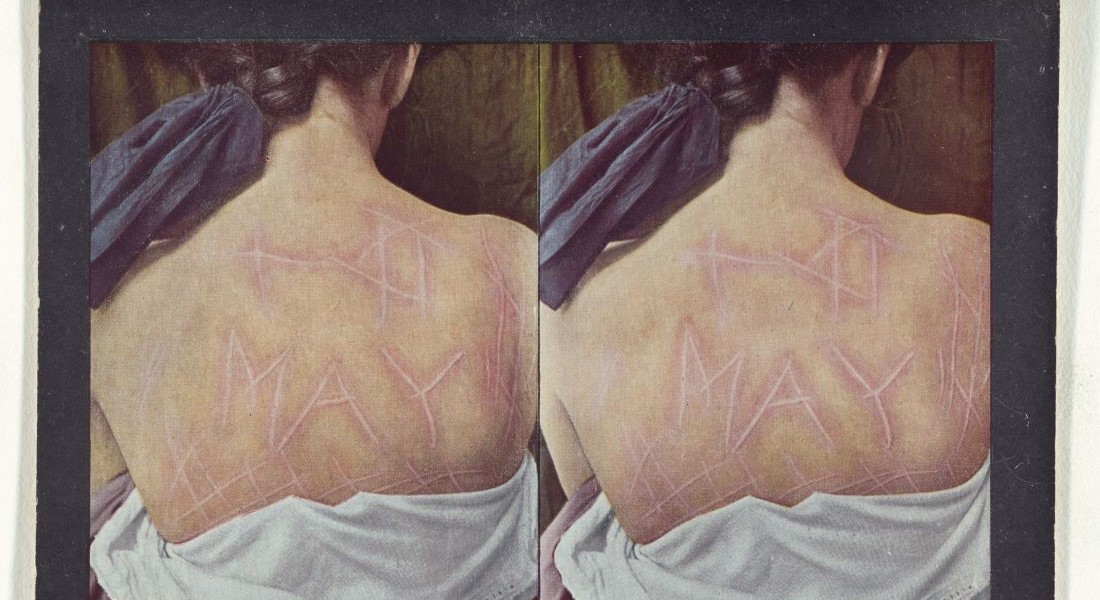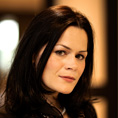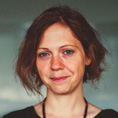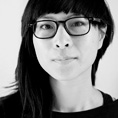Dermacriticism
The interdisciplinary research platform “Dermacriticism” brings together scholars and researchers interested in the vital interplay between skin, the intellectual history of medicine and psychiatry, and the (aesthetic) practices of writing and reading, seeing and touching. Our objective is to promote and develop novel theories and methods for studying skin as a cultural phenomenon, complementary to (and in conversation with) scientific and empirical approaches.

Skin and dermal phenomena can only be understood in terms of complex connections between medicine, anthropology, biology, psychology, culture, and cultural practices such as reading and writing (literature) and art. Historically, the study of human skin has relied heavily on both images and detailed (clinical) descriptions to document and diagnose disease. These practices can serve as an inexhaustible resource for exploring fundamental philosophical and aesthetic ideas that are intimately intertwined with the context of (European) intellectual history as well as the cultural practice of reading and writing. It is evident, however, that current philosophical, scientific, and medical approaches are reshaping our fundamental understanding of what (human) skin is.
A rigorous and critical examination of our deeply held assumptions about what skin is and how it has been described and represented, for example, in literature and the visual arts, serves as the basis for a systematic rethinking of its cultural, normative, and ethical dimensions. This process, which can be described as “thinking in skin” (Hron), offers a new and philosophically nuanced perspective on the ‘skins’ we all inhabit.
Based on these concerns, the purpose of the Dermacriticism research platform is to provide both an open forum for intellectual exchange and cutting-edge research in the field of skin studies, with a particular interest in literary and artistic representations of that “potentially ever-changing personal tapestry that tells the world about who we are or who we want to be” (Jablonski).
Our research provides important insights into the interrelated histories of skin in philosophy, anthropology, medicine, literature, and the arts.
Our aims are:
- To develop new approaches, theories and methods for the study of (human) skin as a cultural and aesthetic phenomenon.
- To provide an open forum for intellectual exchange for skin scholars from various disciplines.
- To promote and foster interdisciplinary dialogue and bring together leading scholars in the field.
- To encourage new thinking and new publications in the field of Skin studies.
- To organize major national and international conferences (e.g. Skin Manuscripts, 2024).
- To disseminate research findings on skin through academic and non-academic publications and media talks.
- To engage in discussions with the broader public, including non-academic contexts
Centre for Modern European Studies (CEMES) (University of Copenhagen, Denmark)
Centre for Culture and the Mind (University of Copenhagen, Denmark)
Cultural Skin Studies (International interdisciplinary network of scholars working on skin in literature and culture)
Skin Ecologies. A Transdisciplinary Network (University of Amsterdam, Netherlands)
The Skin Ecologies Network (Harvard Radcliffe Institute for Advanced Study, Harvard University, USA)
Thinking the European Republic of Letters (Research Group, University of Copenhagen, Denmark)
“Dermacriticism” is embedded in the project “Dermography. Ethics and Aesthetics of Skin Writing”, funded by the European Commission under the Horizon 2020 program.
We welcome proposals for collaborative research on any aspect of our research group. If you would like to become part of our research environment, please contact the director, Irina Hron.
The group will contribute to and benefit from the following project:
Irina Hron: “Dermography. Ethics and Aesthetics of Skin Writing” (DEAS) (Horizon 2020, 2022–2024).
Director

Irina Hron is Associate Professor in the Department of English, Germanic and Romance Studies at the University of Copenhagen. She is editor-in-chief of the series LESESZENEN, published by Universitätsverlag Winter, and co-director of the international research group “Thinking the European Republic of Letters”, funded by the Center for Modern European Studies, Copenhagen/Lund/Malmö Universities. Hron specializes in skin studies and is the director of the international interdisciplinary research platform “Dermacriticism”.
Publications on skin include: “Haut.Lesen. Szenen einer Entfernung bei Marlene Streeruwitz.” Neue Rundschau (2020/3), pp. 89–104 and “The Tale-Tell Skin. Building a Case for Dermacriticism” Orbis Litterarum 79,4 (2024; forthcoming), 31 pp.
Advisory board
 Giovanni Aloi is an author, educator, and curator specializing in the representation of nature and the environment in art. He teaches at the School of the Art Institute of Chicago and is the Editor in Chief of Antennae: The Journal of Nature in Visual Culture. Aloi is the author of Art & Animals (2011), Speculative Taxidermy: Natural History, Animal Surfaces, and Art in the Anthropocene (2018), Why Look at Plants? The Vegetal Emergence in Contemporary Art (2019), Lucian Freud – Herbarium (2019), and the editor of Posthumanism in Art and Science (2020) Vegetal Entwinements in Philosophy and Art (2023) and Estado Vegetal: Performance and Plant Thinking (2023). Aloi has contributed to BBC radio programs, worked at Whitechapel Art Gallery and Tate Galleries in London, and currently is USA correspondent for Esse Magazine. He has curated exhibitions in the US and Europe and is co-editor of the University of Minnesota Press series Art after Nature.
Giovanni Aloi is an author, educator, and curator specializing in the representation of nature and the environment in art. He teaches at the School of the Art Institute of Chicago and is the Editor in Chief of Antennae: The Journal of Nature in Visual Culture. Aloi is the author of Art & Animals (2011), Speculative Taxidermy: Natural History, Animal Surfaces, and Art in the Anthropocene (2018), Why Look at Plants? The Vegetal Emergence in Contemporary Art (2019), Lucian Freud – Herbarium (2019), and the editor of Posthumanism in Art and Science (2020) Vegetal Entwinements in Philosophy and Art (2023) and Estado Vegetal: Performance and Plant Thinking (2023). Aloi has contributed to BBC radio programs, worked at Whitechapel Art Gallery and Tate Galleries in London, and currently is USA correspondent for Esse Magazine. He has curated exhibitions in the US and Europe and is co-editor of the University of Minnesota Press series Art after Nature.
 Ana Antic is Professor of European History and Medical Humanities at the University of Copenhagen. She is a social and cultural historian, PI of the ERC project “Decolonising Madness” and head of the interdisciplinary Centre for Culture and the Mind (CULTMIND). Her research interests revolve around the relationship between psychiatry, politics and violence, as well as the decolonisation of psychiatric practices and concepts in the second half of the 20th century. She received her PhD in modern European history at Columbia in 2012, and, before joining the University of Copenhagen in August 2020, she worked at several UK and US universities. She authored two monographs: Therapeutic Fascism: Experiencing the Violence of the Nazi New Order (OUP 2017), and Non-aligned Psychiatry in the Cold War (Palgrave Macmillan 2022). Antic is the recipient of the 2023 Dan David Prize.
Ana Antic is Professor of European History and Medical Humanities at the University of Copenhagen. She is a social and cultural historian, PI of the ERC project “Decolonising Madness” and head of the interdisciplinary Centre for Culture and the Mind (CULTMIND). Her research interests revolve around the relationship between psychiatry, politics and violence, as well as the decolonisation of psychiatric practices and concepts in the second half of the 20th century. She received her PhD in modern European history at Columbia in 2012, and, before joining the University of Copenhagen in August 2020, she worked at several UK and US universities. She authored two monographs: Therapeutic Fascism: Experiencing the Violence of the Nazi New Order (OUP 2017), and Non-aligned Psychiatry in the Cold War (Palgrave Macmillan 2022). Antic is the recipient of the 2023 Dan David Prize.
 Adam Bencard is Associate Professor in medical humanities at Medical Museion, the University of Copenhagen’s museum for the culture and history of medicine, part of the Institute for Public Health. He is also group leader at the Novo Nordisk Foundation Center for Basic Metabolic Research. He works at the intersection of research and curation, and has curated a number of award-winning exhibitions, including Mind the Gut (winner of the 2019 UMAC Award) and The World is in You (winner of the 2023 Engagement Award from the Organization of Danish Museums). His current research focuses on health complexity, as part of the interdisciplinary Copenhagen Center for Health Complexity.
Adam Bencard is Associate Professor in medical humanities at Medical Museion, the University of Copenhagen’s museum for the culture and history of medicine, part of the Institute for Public Health. He is also group leader at the Novo Nordisk Foundation Center for Basic Metabolic Research. He works at the intersection of research and curation, and has curated a number of award-winning exhibitions, including Mind the Gut (winner of the 2019 UMAC Award) and The World is in You (winner of the 2023 Engagement Award from the Organization of Danish Museums). His current research focuses on health complexity, as part of the interdisciplinary Copenhagen Center for Health Complexity.
 Liv Eidsmo is the Chair of Dermatology and Venereology at Karolinska Institute and a Consultant Dermatologist at Karolinska University Hospital since 2024. She graduated medical school in 1999 and defended her PhD in Immunobiology at Karolinska Institutet in 2006. Following a postdoc (2007–2009) in Frank Carbone’s laboratory at Melbourne University, she returned to Sweden to start up her own lab at the Center for Molecular Medicine (CMM) at Karolinska Institutet in parallel to clinical training in dermatology at Karolinska University Hospital. She was a Professor of Translational Skin Immunology and the Executive Director of the LEO Foundation Skin Immunology Research Center at the University of Copenhagen (2021–2024). Her work has been distinguished with numerous awards, including the Ellis and Ivar Janzon’s Prize, The Swedish Society of Medicine (2017), Marcus and Marianne Wallenberg Clinical Research Fellow (2016) and the Ragnar Söderberg Fellowship (2014).
Liv Eidsmo is the Chair of Dermatology and Venereology at Karolinska Institute and a Consultant Dermatologist at Karolinska University Hospital since 2024. She graduated medical school in 1999 and defended her PhD in Immunobiology at Karolinska Institutet in 2006. Following a postdoc (2007–2009) in Frank Carbone’s laboratory at Melbourne University, she returned to Sweden to start up her own lab at the Center for Molecular Medicine (CMM) at Karolinska Institutet in parallel to clinical training in dermatology at Karolinska University Hospital. She was a Professor of Translational Skin Immunology and the Executive Director of the LEO Foundation Skin Immunology Research Center at the University of Copenhagen (2021–2024). Her work has been distinguished with numerous awards, including the Ellis and Ivar Janzon’s Prize, The Swedish Society of Medicine (2017), Marcus and Marianne Wallenberg Clinical Research Fellow (2016) and the Ragnar Söderberg Fellowship (2014).
 Nina Jablonski is an anthropologist whose important contributions have rested on her research on the evolution of human skin, including the biological and social significance of “naked” human skin, sweating, touch, and skin color. Jablonski’s research on the evolution of skin pigmentation has revealed why dark skin evolved under conditions of high ultraviolet radiation (UVR) in the tropics while lighter skin was favored under conditions of lower UVR nearer the poles. This work led her to write extensively on the fallacy of skin-color-based human races and the pervasive damage done to human societies through the persistence of race concepts. She also has a distinguished record of field and laboratory research on the evolution of nonhuman primates. Jablonski received her A.B. in Biology at Bryn Mawr College and a Ph.D. in Anthropology at the University of Washington. She currently holds the positions of Atherton Professor and Evan Pugh University Professor of Anthropology, Emerita, at The Pennsylvania State University. Jablonski has authored over 200 scientific papers and four books for popular audiences, two of which are for children. She is a member of the U.S. National Academy of Sciences, the American Philosophical Society, and the American Academy of Arts & Sciences, and has received a Guggenheim Fellowship. Jablonski received an honorary doctorate from the University of Stellenbosch in South Africa in 2010 for her contribution to the worldwide fight against racism.
Nina Jablonski is an anthropologist whose important contributions have rested on her research on the evolution of human skin, including the biological and social significance of “naked” human skin, sweating, touch, and skin color. Jablonski’s research on the evolution of skin pigmentation has revealed why dark skin evolved under conditions of high ultraviolet radiation (UVR) in the tropics while lighter skin was favored under conditions of lower UVR nearer the poles. This work led her to write extensively on the fallacy of skin-color-based human races and the pervasive damage done to human societies through the persistence of race concepts. She also has a distinguished record of field and laboratory research on the evolution of nonhuman primates. Jablonski received her A.B. in Biology at Bryn Mawr College and a Ph.D. in Anthropology at the University of Washington. She currently holds the positions of Atherton Professor and Evan Pugh University Professor of Anthropology, Emerita, at The Pennsylvania State University. Jablonski has authored over 200 scientific papers and four books for popular audiences, two of which are for children. She is a member of the U.S. National Academy of Sciences, the American Philosophical Society, and the American Academy of Arts & Sciences, and has received a Guggenheim Fellowship. Jablonski received an honorary doctorate from the University of Stellenbosch in South Africa in 2010 for her contribution to the worldwide fight against racism.
 Li-Wen Kuo is a German-Taiwanese artist whose work has been acknowledged by renowned international curators, art critics and art historians. Her art has been exhibited in Hamburg, Munich, Basel, Bonn, Berlin, Karlsruhe and Wiesbaden. Her publications include Li-Wen Kuo. Ed. Alexander Knopf. Berlin: Kerber Verlag (2021), Dissonance – Platform Germany. A Changed Vision – New Painting from Germany. Eds. Mark Gisbourne and Christoph Tannert. Berlin: DCV Dr.Cantz'sche Verlagsgesellschaft (2022) and Now! Painting in Germany Today. Eds. Stephan Berg, Frédéric Bußmann, Alexander Klar. München: Hirmer Verlag (2019). Kuo is working with representations of molting, skin-like layers and the interplay of surfaces, text and skin.
Li-Wen Kuo is a German-Taiwanese artist whose work has been acknowledged by renowned international curators, art critics and art historians. Her art has been exhibited in Hamburg, Munich, Basel, Bonn, Berlin, Karlsruhe and Wiesbaden. Her publications include Li-Wen Kuo. Ed. Alexander Knopf. Berlin: Kerber Verlag (2021), Dissonance – Platform Germany. A Changed Vision – New Painting from Germany. Eds. Mark Gisbourne and Christoph Tannert. Berlin: DCV Dr.Cantz'sche Verlagsgesellschaft (2022) and Now! Painting in Germany Today. Eds. Stephan Berg, Frédéric Bußmann, Alexander Klar. München: Hirmer Verlag (2019). Kuo is working with representations of molting, skin-like layers and the interplay of surfaces, text and skin.
 Virginia Langum is professor of English literature at Umeå University, Sweden. Her research concerns medicine, literature and culture, particularly the connections between the body and religious experience, as well as medicine and ethics, extending from the Middle Ages to our own period. She is currently working on illness experience and historical medical tourism in the 19th century.
Virginia Langum is professor of English literature at Umeå University, Sweden. Her research concerns medicine, literature and culture, particularly the connections between the body and religious experience, as well as medicine and ethics, extending from the Middle Ages to our own period. She is currently working on illness experience and historical medical tourism in the 19th century.
Researchers
Internal
| Name | Title | Phone | |
|---|---|---|---|
| Antic, Ana | Professor | +4535330754 | |
| Bencard, Adam | Associate Professor | +4535320875 | |
| Benne, Christian | Professor | +4535330085 | |
| Lock, Charles | Professor | +4535328622 |
External
Contact
Director: Irina Hron

